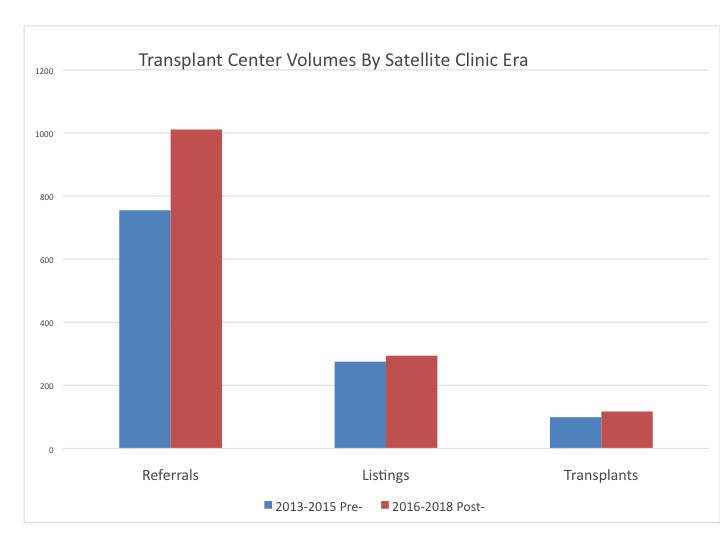Increasing Access to Kidney Transplantation Through a Satellite Clinic
Vanderbilt University Medical Center, Nashville, TN
Meeting: 2020 American Transplant Congress
Abstract number: D-197
Keywords: Kidney transplantation, N/A, Outpatients
Session Information
Session Name: Poster Session D: Non-Organ Specific: Disparities to Outcome and Access to Healthcare
Session Type: Poster Session
Date: Saturday, May 30, 2020
Session Time: 3:15pm-4:00pm
 Presentation Time: 3:30pm-4:00pm
Presentation Time: 3:30pm-4:00pm
Location: Virtual
*Purpose: Distance to a transplant center, a potential barrier for candidates seeking kidney transplant evaluation, can be addressed by satellite clinics. Here we describe our center’s experience with the establishment of a pretransplant evaluation satellite clinic.
*Methods: In late 2015, we opened a pretransplant evaluation clinic located 100 miles from our transplant center including a catchment area for rural patients. Referrals for patients within closer proximity to the satellite clinic than the transplant center received priority scheduling. We collected demographic and clinical characteristics of candidates evaluated in the clinic, including distance of travel saved by using zip code data. We examined trends in transplant referrals, listings and evaluations from the catchment area before (2013-2015) and after (2016-2018) the clinic was established.
*Results: Over a 4 year period, 601 candidates were evaluated at the satellite clinic: mean age 54y, 64% male, 36% black, 40% with some HS education or HS graduate, 37% with Medicare as primary insurance, 8% with prior transplant, 45% with DM, 24% with CAD, 16% not on dialysis, 36% seeking multi-listing. Median distance from the candidate’s home to the satellite clinic was 59 miles while median distance to the transplant center was 135 miles. Median roundtrip travel distance saved by going to the satellite clinic instead of the transplant center was 190 miles. Median time from referral to evaluation and evaluation to decision in 2019 were 133d and 76d, respectively. 265 (44%) candidates were ultimately approved while 282 (47%) were turned down. Of the 265 approved, 41 (15%) have been transplanted. Of the 282 turned down, 172 (61%) and 45 (16%) were turned down for medical and psychosocial reasons, respectively. Referrals (1,011 vs 755), listings (294 vs 275) and transplants (117 vs 99) for patients residing in the catchment area increased over time and were higher in the post- (2016-2018) compared to the pre-satellite clinic era (2013-2015). These accounted for 24%, 24% and 19% of all transplant center referrals, listings and transplants, respectively, over the study period.
*Conclusions: A pretransplant evaluation satellite clinic reduces travel distance for candidates, potentially improving access to kidney transplantation, and appears to contribute to increasing transplant center volumes.
To cite this abstract in AMA style:
Naik RH, Ramos E, Paueksakon B, Lyles A, Smith L, Lawson J, Zavala E, Shawar S, Helderman JH, Karp S, Shaffer D, Forbes R, Concepcion BP. Increasing Access to Kidney Transplantation Through a Satellite Clinic [abstract]. Am J Transplant. 2020; 20 (suppl 3). https://atcmeetingabstracts.com/abstract/increasing-access-to-kidney-transplantation-through-a-satellite-clinic/. Accessed February 23, 2026.« Back to 2020 American Transplant Congress

